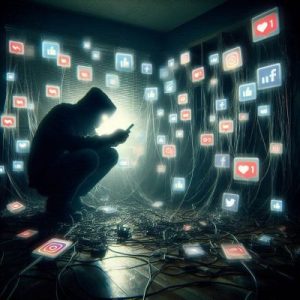You might not realize that phobias related to technology are becoming increasingly common in our fast-paced world. As you navigate life filled with smartphones, social media, and constant connectivity, these fears can creep in, affecting your daily interactions and mental well-being. From the anxiety of losing your phone to the overwhelming pressure of online validation, these phobias illustrate a complex relationship with modern life. What do these fears reveal about how you engage with technology and its impact on your mental health?
Nomophobia
Nomophobia, or  the fear of being without a mobile phone, affects a significant portion of the population today. You mightn’t realize how deeply mobile dependency has woven itself into your daily life until you’re confronted with the prospect of being disconnected.
the fear of being without a mobile phone, affects a significant portion of the population today. You mightn’t realize how deeply mobile dependency has woven itself into your daily life until you’re confronted with the prospect of being disconnected.
Research indicates that over 50% of smartphone users experience anxiety when they don’t have access to their devices. This phenomenon reflects a broader trend toward smartphone addiction, which is more than just a passing concern; it’s an ingrained aspect of modern existence.
When your phone is out of reach, you may feel a rush of panic—a physical response that can include increased heart rate and sweating. This reaction isn’t merely mental; it signals that your brain’s reward system has been conditioned to associate mobile usage with comfort and security.
You find yourself checking for notifications, scrolling through social media, or even just holding your phone for reassurance. This cycle reinforces the connection between your emotional well-being and your device.
Moreover, studies show that excessive mobile dependency can lead to social isolation, as face-to-face interactions decline. Instead of engaging with those around you, you often turn to your screen for connection, perpetuating the cycle of smartphone addiction.
Recognizing this pattern is essential for regaining control over your relationship with technology. By understanding the impact of nomophobia, you’re better equipped to take proactive steps toward a healthier balance in your life.
Cyberphobia
The mere thought of logging into a computer can trigger a wave of anxiety for those suffering from cyberphobia, the intense fear of computers or technology. This phobia can stem from various sources, such as negative experiences with technology, feelings of inadequacy in a digital world, or fear of privacy invasion.
If you find yourself constantly worried about the implications of technology in your life, you might relate to the following aspects of cyberphobia:
-
Virtual Reality Anxiety: The rise of virtual reality can amplify feelings of disconnection or fear, making it harder for you to engage with immersive technologies without feeling overwhelmed.
-
Digital Detox Challenges: The idea of taking a break from screens can be intimidating. You may struggle with the thought of missing out on important information or connections.
-
Social Isolation: The fear of technology often leads to avoidance, which can result in loneliness. You might feel trapped between wanting to connect and fearing the devices that facilitate that connection.
Understanding cyberphobia is vital for overcoming it. Many people benefit from gradual exposure to technology, starting with less intimidating tasks.
Engaging in a digital detox can also help you recalibrate your relationship with technology, allowing you to regain control and reduce anxiety.
Technophobia
Technophobia, a pervasive fear of technology, can considerably impact your daily life and overall well-being. You might find yourself avoiding modern devices or applications, leading to feelings of isolation and frustration. This fear often stems from a lack of understanding or previous negative experiences with technology.
For example, the rapid advancement in virtual reality can feel overwhelming, making you anxious about your ability to adapt or engage with new experiences.
When you experience technophobia, it’s crucial to recognize that you’re not alone. Research shows that many people share similar fears, which can manifest in various ways, such as avoiding online interactions or feeling anxious when faced with new gadgets.
This avoidance can create a cycle of anxiety, making it even harder to confront your fears.
One effective way to manage technophobia is through a digital detox. Taking breaks from devices can help you regain control and reduce anxiety.
During this detox, you might explore alternative activities, like reading or spending time in nature, which can help you reconnect with the world beyond screens.
Gradually reintroducing technology at a comfortable pace can also aid in desensitization, allowing you to approach it with a more balanced mindset.
Social Media Anxiety
While scrolling through social media can seem harmless, many people find themselves grappling with social media anxiety, an intense fear of how they’re perceived online. This anxiety often stems from social comparison, where you measure your worth against curated images and posts of others. You might feel inadequate, anxious, or even depressed as you scroll through seemingly perfect lives, leading to a toxic cycle of self-doubt.
Here are three key factors that contribute to social media anxiety:
-
Curated Lives: Most users only share their highlights, which can distort your perception of reality and fuel feelings of inadequacy.
-
Fear of Missing Out (FOMO): You may worry that you’re not part of social events or experiences, leading to a sense of exclusion and increased anxiety.
-
Online Validation: The need for likes and comments can create pressure to present a perfect image, causing stress and leading to obsessive behaviors.
To combat social media anxiety, consider a digital detox. Taking breaks from social media can help you regain perspective and reduce the impact of social comparison.
Engaging in real-life interactions and focusing on personal growth can enhance your self-esteem and overall well-being.
Information Overload Anxiety
In today’s digital age, an overwhelming amount of information bombards you daily, leading to what many experience as information overload anxiety. With constant notifications, emails, and the endless scroll of social media, it’s easy to feel swamped. This flood of information can create significant cognitive overload, making it difficult to focus and process what truly matters.
You might find yourself constantly distracted, struggling to sift through data for relevant insights. This digital distraction doesn’t just disrupt your workflow; it can also lead to feelings of anxiety and stress. Research shows that when your brain is overwhelmed, your ability to make decisions diminishes, and simple tasks can feel insurmountable.
You may even start to dread checking your messages or news feeds, fearing the additional weight of information. Moreover, the pressure to stay informed can exacerbate your anxiety. The fear of missing out (FOMO) on important updates adds another layer of stress, causing you to engage in compulsive checking behaviors.
This cycle of anxiety can be detrimental to your mental wellbeing, leading to fatigue and burnout over time. To combat information overload anxiety, consider setting boundaries. Designate specific times for checking emails and social media, and limit your exposure to news.
Conclusion
In a world where technology reigns supreme, it’s no wonder you’re grappling with these phobias. The fear of losing your phone can feel like a mini heart attack, while the dread of computers can paralyze you in the workplace. As the pressure of social media mounts, your self-worth becomes a precarious tightrope walk. Information overload can drown you in a sea of data. Recognizing these fears is the first step toward reclaiming your peace in this digital whirlwind.





